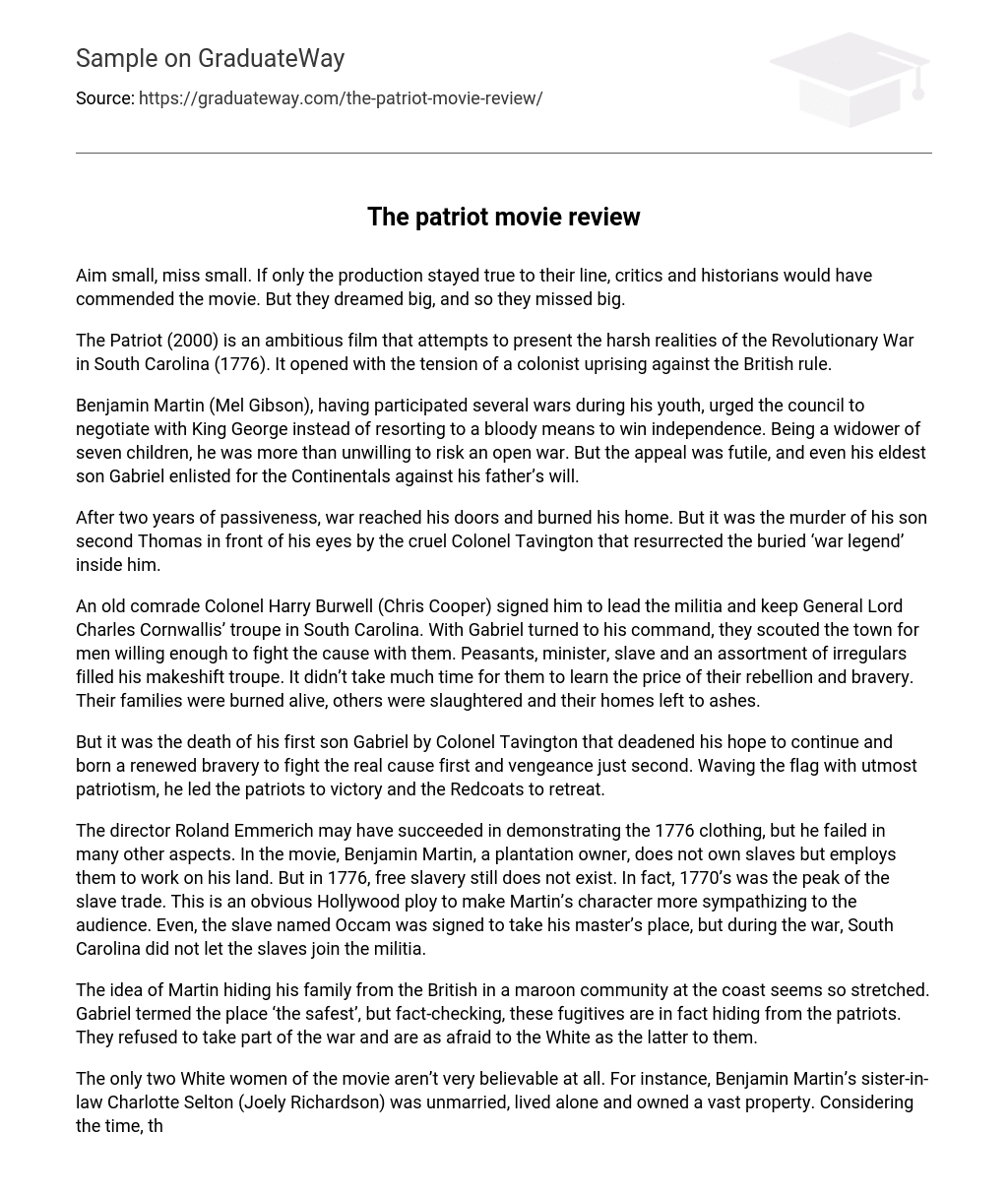Aim small, miss small. If only the production stayed true to their line, critics and historians would have commended the movie. But they dreamed big, and so they missed big.
The Patriot (2000) is an ambitious film that attempts to present the harsh realities of the Revolutionary War in South Carolina (1776). It opened with the tension of a colonist uprising against the British rule.
Benjamin Martin (Mel Gibson), having participated several wars during his youth, urged the council to negotiate with King George instead of resorting to a bloody means to win independence. Being a widower of seven children, he was more than unwilling to risk an open war. But the appeal was futile, and even his eldest son Gabriel enlisted for the Continentals against his father’s will.
After two years of passiveness, war reached his doors and burned his home. But it was the murder of his son second Thomas in front of his eyes by the cruel Colonel Tavington that resurrected the buried ‘war legend’ inside him.
An old comrade Colonel Harry Burwell (Chris Cooper) signed him to lead the militia and keep General Lord Charles Cornwallis’ troupe in South Carolina. With Gabriel turned to his command, they scouted the town for men willing enough to fight the cause with them. Peasants, minister, slave and an assortment of irregulars filled his makeshift troupe. It didn’t take much time for them to learn the price of their rebellion and bravery. Their families were burned alive, others were slaughtered and their homes left to ashes.
But it was the death of his first son Gabriel by Colonel Tavington that deadened his hope to continue and born a renewed bravery to fight the real cause first and vengeance just second. Waving the flag with utmost patriotism, he led the patriots to victory and the Redcoats to retreat.
The director Roland Emmerich may have succeeded in demonstrating the 1776 clothing, but he failed in many other aspects. In the movie, Benjamin Martin, a plantation owner, does not own slaves but employs them to work on his land. But in 1776, free slavery still does not exist. In fact, 1770’s was the peak of the slave trade. This is an obvious Hollywood ploy to make Martin’s character more sympathizing to the audience. Even, the slave named Occam was signed to take his master’s place, but during the war, South Carolina did not let the slaves join the militia.
The idea of Martin hiding his family from the British in a maroon community at the coast seems so stretched. Gabriel termed the place ‘the safest’, but fact-checking, these fugitives are in fact hiding from the patriots. They refused to take part of the war and are as afraid to the White as the latter to them.
The only two White women of the movie aren’t very believable at all. For instance, Benjamin Martin’s sister-in-law Charlotte Selton (Joely Richardson) was unmarried, lived alone and owned a vast property. Considering the time, this is very unlikely. Women were forced to marry young for moral and economic reasons. The other, Anne Howard (Lisa Brenner) spoke openly to the minister and the churchgoers to rally support to Gabriel’s mission. Watching this very scene caused me to finally dub ‘The Patriot’ as nothing but a Hollywood spectacle. In 1776, there was a great segregation not just of slaves, but also of women.
If only the production did as much historical research as their cinematic style, they would have made the movie more believable. With its horrid depiction of the American Revolution and the unrestrained violence that might stain the new generation’s view of history, it is likely that instead of rallying a better understanding, the movie only spawns more civil conflicts.
The movie failed to reveal the true complexity of this particular time in history. But it far succeeded in showing the harshness a war could bring and igniting the people’s appreciation to the freedom so nobly attained by patriots we never cared to know.





